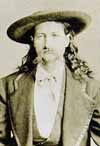| |
"Wild Bill"
Hickok
b. May 27, 1837, Troy
Grove, Ill., U.S.
d. Aug. 2, 1876, Deadwood, Dakota Territory [now in South
Dakota, U.S.]
real name JAMES
BUTLER HICKOK, an American frontiersman, army scout, marksman, and gambler who
became an American legend. His reputation as a marksman gave rise to legends
and tales about his life.
 As a child in Illinois, he worked on neighbouring farms
and helped his father in assisting escaped slaves. He left home in 1856 to farm
in Kansas and there became involved in the Free State (antislavery) movement.
He later served as a village constable in Monticello, Kan. While working as a
teamster in 1861, he killed Dave McCanles at Rock Creek (Nebraska Territory),
and legends about him probably began in the exaggerated tales of his role in
this gunfight. "Wild Bill" Hickok also lived in Springfield and scouted for the
Federals; he was acquitted there of the murder of Dave Tutt. As a child in Illinois, he worked on neighbouring farms
and helped his father in assisting escaped slaves. He left home in 1856 to farm
in Kansas and there became involved in the Free State (antislavery) movement.
He later served as a village constable in Monticello, Kan. While working as a
teamster in 1861, he killed Dave McCanles at Rock Creek (Nebraska Territory),
and legends about him probably began in the exaggerated tales of his role in
this gunfight. "Wild Bill" Hickok also lived in Springfield and scouted for the
Federals; he was acquitted there of the murder of Dave Tutt.
The man
who became marshal of Abilene, Kan., on April 15, 1871, was a frontier dandy.
He stood 6 foot 3 in his custom-made boots. His riveting gray eyes, set off by
a drooping mustache, seemed to look right through people. Beneath the black hat
with the sweeping brim, blond hair tumbled to his shoulders, and a Prince
Albert frock coat showed off broad shoulders and a narrow waist.
During
the American Civil War Hickok worked for the Union as a teamster, scout, and
spy. After the war he was appointed deputy U.S. marshal, and he later became a
scout for the army. Hickok is remembered particularly for his services in
Kansas as sheriff of Hays City and marshal of Abilene, where his ironhanded
rule helped to tame two of the most lawless towns on the frontier. From 1872 to
1874 Hickok traveled through New York state with Buffalo Bill's Wild West show,
then drifted some more.
In 1876 he met and married a widowed actress,
Mrs. Agnes Lake, née Mersman, but he soon left her (in Cincinnati) to
visit the goldfields of the Black Hills in the Dakota Territory.
Tim
Brady and Johnny Varnes, two leaders of the Deadwood underworld, initiated a
plot to kill Hickok so he wouldn't be appointed marshal. Jim Levy and Charlie
Storms, two noted gunmen, were offered the job but turned it down. Had they
known about Hickok's bad eyesight, they might well have accepted.
August 2, at about 4 p.m., he joined a poker game in Carl Mann's Saloon
No. 10. The other players were Charles Rich, a gunman in his own right, Con
Stapleton, Carl Mann himself, and Captain Willie Massie, a Missouri steamboat
pilot.
Hickok had a short conversation at the bar with Harry Young
before he sat down. He was the last to be seated, and the only chair left for
him put his back to the back door. Hickok, as a precaution, always sat with his
back to the wall, and asked Charles Rich to change places with him. Rich just
laughed and stayed in his chair. But Hickok's conspirators had finally found
their man-Jack McCall.
A local bum who used several aliases, McCall
entered the saloon unnoticed, as he often worked at menial jobs in the place.
McCall began moving, quite casually, toward the back door behind Hickok's
chair. Once there, he stopped and watched the game for a few minutes. Hickok
and Massie were discussing the captain's habit of sneaking looks at his
opponent's discards. The other players stared at their hands.
Nobody was
paying any attention to McCall. Suddenly the air was shattered by a loud crash,
as McCall pulled a .45-caliber revolver from his coat pocket and shot Hickok in
the back of the head from three feet. Hickok hung suspended in time for a
moment and then toppled over backward, the cards in his hand dropping to the
floor. That hand, which included a pair of aces and a pair of eights, became
known as the Dead Man's Hand. The suits of those cards is generally
accepted to be clubs and spades, that is they were all black. What the fifth
card was is still being disputed, it seems likely that nobody will ever know
these details for sure.
Owing to the number of poker players who died
during disputes, Dead man's hand was already established poker idiom for a
number of a different hands long before Hickok died. In 1886, ten years after
Hickok's death, the Dead man's hand was explained as being three Jacks and a
pair of Tens in a North Dakota newspaper which attributed the term to a
specific game held in Illinois 40 years earlier, indicating that Hickok's hand
had yet to gain widespread popularity. Eventually, Hickok's "Aces and eights"
became widely accepted as the "Dead Man's Hand. In 1979 Hickok was inducted
into the Poker Hall of Fame.
Jack McCall was tried by an illegal miner's
court in Deadwood on August 3 and found not guilty. Later, he was tried in
Yankton, Dakota Territory, and this time he was found guilty. He was hanged on
March 1, 1877. |
 |
| |
|
|
